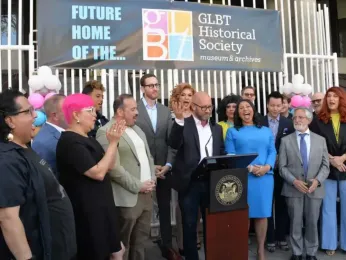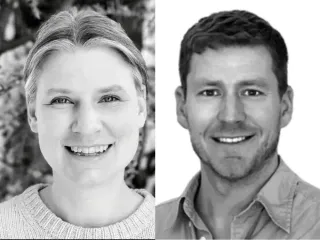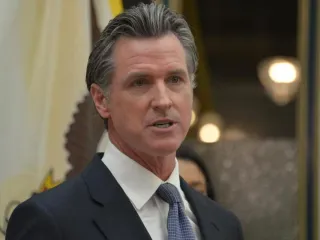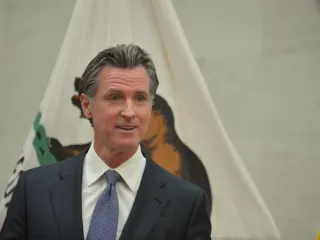
Aug 5
Political Notebook: SF LGBTQ museum lease delay impacts CA funds
Matthew S. Bajko READ TIME: 8 MIN.
With talks dragging on between San Francisco officials and the GLBT Historical Society over the lease for a new LGBTQ museum in the city’s Castro neighborhood, the delay is raising concerns about a looming deadline for the project to tap into $5.5 million in state funding for it. Currently, those funds are to be used by next summer.
Now, gay state Senator Scott Wiener (D-San Francisco) aims to extend that deadline to the end of 2027. He had initially secured the state funds for the museum project in 2022, and as chair of the Senate Budget Committee, had inserted language into California’s 2025 state budget to roll over the unused funds to next year.
“The money is there and ready to be used. It does have a deadline of next year,” Wiener told the Bay Area Reporter in a recent phone interview.
That deadline is June 30. But after hearing from gay San Francisco Board of Supervisors President Rafael Mandelman with concerns of seeing the city meet that date, Wiener now plans to include extending it by 18 months in the budget trailer bills to be taken up by state legislators in the coming weeks. Those need to be passed by mid-September when the legislative session ends.
“It looks like they could use an extension, which is something I support and will try to get that done in the budget cleanup that the Legislature needs to do each year,” said Wiener, adding that he “would support extending it to the end of 2027 to give them plenty of time to get it done.”
Mandelman told the B.A.R. in light of the current 2026 deadline, “We probably need a longer runway than that.”
Any change to the budget language in the fiscal bills that Governor Gavin Newsom signed into law in late June requires agreement between the governor’s office and the Legislature’s two chambers, noted Wiener, who cautioned those talks are “complicated.” He added, “You are never guaranteed success” when it comes to the budget, so demurred when asked how confident he was of securing the extension for the museum funds.
As the B.A.R. was first to report last September, the administration of former mayor London Breed bought the Market & Noe Center at 2280 Market Street for $11.6 million to serve as the permanent home for the GLBT Historical Society’s museum and archival center. It brought to an end a two-decades-long search for a suitable site for the museum, which for years has been housed in leased storefronts on 18th Street in the heart of the LGBTQ Castro district, while its archives are housed in rented space downtown along with its staff offices.
As part of the deal to purchase the two-story commercial building for the archival preservation nonprofit, the city's Real Estate Division was given oversight of the property while working out a lease agreement with the historical society and the Community Arts Stabilization Trust. Known as CAST, the community-centered, arts and culture focused real estate organization works to secure and steward affordable spaces for nonprofit arts and culture organizations in San Francisco.
CAST was announced as the prospective property manager until such time that the LGBTQ nonprofit was able to take full control of the prominent corner structure at a main entry point into the historic Duboce Triangle neighborhood that borders the Castro. The plan is for the historical society to first move into the vacant second floor, with build out of the space for its museum installations to be covered by the state funds and additional money raised by the nonprofit via a capital campaign.
The current tenants of the building’s ground floor commercial spaces are to move out when their leases expire, with the expectation that the historical society will expand into them to become the sole occupant. Barry's Bootcamp is subleasing its storefront from CVS and can remain through 2040, while UCSF Health-GoHealth Urgent Care has a lease for its clinic through 2036.
Under terms announced last year by city officials, the city was to retain 10% of the monthly $58,000 in lease payments from the commercial tenants and put the rest of the money into a separate reserve account to be used by the historical society for capital improvements and possibly programming. It had been thought CAST would be the master leaseholder and enter into a sublease with the historical society while receiving 10% of the lease payments for taking on the property manager role from the city.
But since the announcement from last September the historical society is now planned to be the master leaseholder and the city will enter into a contract with CAST to serve solely in a property management and asset management role, helping to train staff with the archival group to perform such functions in the future. CAST’s fee for doing so is expected to be 10% of the total gross revenues for the building, which would be covered by any lease payments made by the historical society in addition to the two commercial tenants.
The city's long-term goal is to eventually transfer ownership of the property to the GLBT Historical Society. It had been anticipated that the lease agreement would have been introduced to the Board of Supervisors for approval by mid-2025.
When asked for comment about the lease status, a spokesperson for Mayor Daniel Lurie declined since the process is ongoing and referred the B.A.R. to the city's Real Estate Division, which recently welcomed Sally Oerth as the new director of real estate. It now is eying having the lease finalized by late 2025, and due to the ongoing negotiations, the division declined the B.A.R.’s interview request when asked in late July for an update.
In a statement, the division housed within the City Administrator’s office told the B.A.R. it “is in active negotiations to lease space for the LGBTQ Museum. We have been working in close partnership with Mayor Lurie and President Mandelman’s offices. We are aware of the deadline for state funding and believe we are headed in a direction to have a lease by the end of the year."
With the supervisors now on their summer recess until September 2, the board would not be able to take up voting on the lease until October at the earliest. It would first need to be officially introduced, which normally prompts a 30-day timeline to be scheduled for a hearing before one of the supervisor’s committees. Once the panel assigned to review the lease votes on the matter, then it will go before the full board for final adoption.
“I am of the opinion we can get something introduced in September,” Mandelman told the B.A.R. in late July ahead of his annual summer pilgrimage to the LGBTQ travel destination of Provincetown on the tip of Cape Cod in Massachusetts.
As for the delay in being able to do so, Mandelman said, “I think it is complicated on both the city’s side and the historical society’s side on exactly how this is going to work. I think there is some clarity and people are rowing in the same direction, and I just think we need to pick up the pace.”
CAST Managing Director of Real Estate Carolyn Choy told the B.A.R. in an August 1 phone interview that she is confident the lease talks will wrap up in the coming weeks and be finalized by year’s end. It has experience working out such an agreement with the city, as CAST is the master leaseholder for San Francisco Recreation & Parks Department’s historic Geneva Car Barn and Powerhouse building in the Excelsior neighborhood and subleases with the nonprofit Performing Arts Workshop to operate it as a neighborhood arts center.
“I think we all have been diligently working on this since the spring and are continuing to work together to push this forward. We all want the same outcome,” said Choy, adding that, “we would love to do this by the timeline Supervisor Mandelman described.”
Gay GLBT Historical Society Executive Director Roberto Ordeñana told the B.A.R. he “is confident” of seeing the lease negotiations wrap up in the coming months. He said the negotiations “are moving along” and his organization expects to be able to gain access to the new museum site by early 2026.
“I really appreciate that the Real Estate Division is leading this, but also members of Mayor Lurie’s administration and Supervisor Mandelman are all working really hard with us to get to a lease,” said Ordeñana. “We are really confident that is going to materialize in the fall or by the end of this year. We are really looking to the moment when we have site control so we can begin to test out all of our assumptions on how much is it going to cost to renovate the space then begin the design and build out process.”
Until then, the historical society is uncertain of the price tag for the renovations and how much it will need to raise in addition to the state funds allocated toward the project. No matter the cost, the nonprofit is planning to launch a capital campaign sometime in 2026 to raise additional funds to help pay for moving into the new space as well as ongoing programming and other needs.
“A project like this takes a lot of resources,” noted Ordeñana. “It is wonderful to be in a position where we can leverage the grant funds from the state that Senator Wiener was so instrumental in ensuring that we have. On top of that, we expect to have to mount a capital campaign to support any other capital costs that won’t get covered by those state grant funds.”
He added, “We also want to ensure that the programs and operations are set up for success when we open the doors. We want to make sure this is a financially sustainable project for the long-term.”
Mandelman said his aim is to see work on the new building for a relocated and expanded museum commence next year. The new location is a little over 11,000 square feet, while the LGBTQ museum is currently housed in a space just shy of 1,700 square feet.
“There is a lot of redevelopment work that needs to happen,” noted Mandelman, adding that city departments will first need to sign off on the drawings for the altered space and various permitting needed. “My hope is we can move that as quickly as we can and get them into construction ideally in 2026. But it is tight, and this is not easy to figure out how to make things work.”
Nonetheless, Mandelman told the B.A.R. he is “still hopeful; I am still optimistic about this.”
As for an opening date, Ordeñana told the B.A.R. late in 2026 is still a possibility. The lease for its current GLBT Historical Society Museum at 4127 18th Street runs through the end of this year, and the nonprofit has been talking to Walgreens, from which it subleases the commercial space adjacent to the company’s specialty pharmacy, about an extension.
“We are all working to be able to get this up and running as soon as possible,” said Ordeñana. “I am confident once we get in there to do an assessment, we will really understand how long is this buildout going to take.”
In the meantime, anyone who wants to support the historical society should consider buying a ticket to its upcoming gala on October 18, said Ordeñana. The nonprofit is celebrating its 40th anniversary and has made some changes to its annual major fundraising event, among them serving a seated dinner this year.
Early bird general admission tickets are currently $225 and can be bought online at glbthistory.org/reunion.
WEB: https://www.glbthistory.org/reunion
Web Extra: For more queer political news, be sure to check http://www.ebar.com Monday mornings for Political Notes, the notebook's online companion. This week's column reported on lesbian California gubernatorial candidate Toni Atkins’ battling impressions her bid is a lost cause.
Keep abreast of the latest LGBTQ political news by following the Political Notebook on Threads @ https://www.threads.net/@matthewbajko and on Bluesky @ https://bsky.app/profile/politicalnotes.bsky.social.
Got a tip on LGBTQ politics? Call Matthew S. Bajko at (415) 829-8836 or email [email protected].



